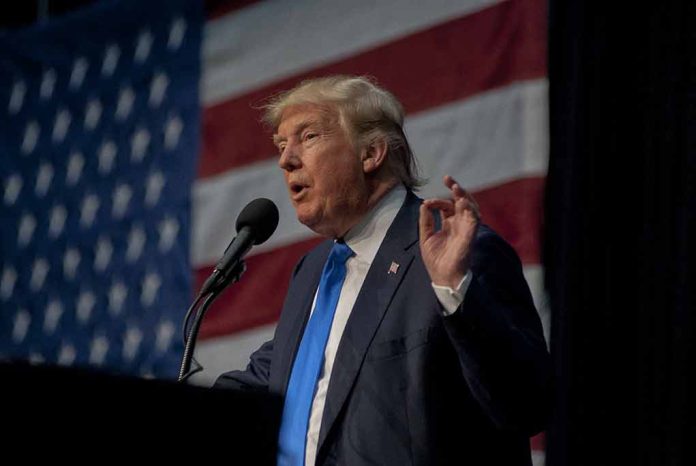
The Biden administration’s Justice Department takes an unexpected stance in defending former President Trump against Capitol riot lawsuits, raising questions about presidential immunity and accountability.
At a Glance
- Biden’s DOJ defends Trump in Capitol riot lawsuits, citing presidential immunity
- Supreme Court ruling grants partial immunity to Trump, delaying criminal trials
- Decision sparks debate on presidential accountability and legal precedents
- Trump can still be sued for actions potentially inciting violence on January 6
DOJ’s Unexpected Defense of Trump
In a surprising turn of events, President Joe Biden’s Justice Department has chosen to defend former President Donald Trump in lawsuits related to the January 6 Capitol riot. This decision underscores the principle of presidential immunity and reflects a commitment to upholding long-standing legal doctrines, regardless of political affiliations. The move has ignited a debate about the balance between presidential accountability and established legal precedents.
The Justice Department’s stance aligns with a recent Supreme Court ruling that granted Trump partial immunity from criminal prosecution. This ruling has far-reaching implications for the ongoing legal battles surrounding the former president and the events of January 6, 2021.
Understanding Presidential Immunity
The concept of presidential immunity has been a cornerstone of American jurisprudence, designed to protect presidents from undue legal harassment while performing their official duties. However, the recent Supreme Court decision has added nuance to this principle, distinguishing between “official acts” and “unofficial acts” of a president.
This distinction is crucial in the context of Trump’s actions surrounding the Capitol riot. While the ruling provides immunity for official presidential duties, it does not extend to private acts that may have incited violence. This partial immunity has led to delays in Trump’s criminal trials, as lower courts must now determine which actions fall under official presidential duties.
Controversy and Debate
The Justice Department’s decision to defend Trump has sparked controversy across the political spectrum. Critics argue that it potentially undermines efforts to hold the former president accountable for his alleged role in the events of January 6. President Biden himself has been vocal in his criticism of the Supreme Court’s ruling on presidential immunity.
Joe Biden says presidents' immunity from prosecution created a “dangerous precedent” that place them “above the law,” after a Supreme Court ruling paved the way for Donald Trump to potentially escape prosecution for his role in the Jan. 6 US Capitol riot https://t.co/NzwGwcOk5C pic.twitter.com/gmSQgRBfe3
— Bloomberg (@business) July 2, 2024
Biden’s statement reflects a concern shared by many that the ruling could set a dangerous precedent, potentially shielding future presidents from accountability for their actions while in office. The three liberal justices on the Supreme Court echoed this sentiment in their dissent, with Justice Sonia Sotomayor stating that the ruling effectively makes “the president now a king above the law.”
Implications for Trump’s Legal Challenges
While the Justice Department’s stance and the Supreme Court ruling provide Trump with some legal protection, they do not grant him blanket immunity. The DOJ has clarified that a president is not protected by “absolute immunity” if his words incite imminent private violence. This distinction leaves the door open for lawsuits against Trump by injured Capitol Police officers and Democratic lawmakers.
U.S. District Judge Amit Mehta has already ruled that Trump’s words on January 6, including calls to “march to the Capitol” and “fight like hell,” were likely “words of incitement not protected by the First Amendment.” This ruling allows several civil lawsuits against Trump to proceed, potentially setting the stage for further legal battles.
Broader Impact on Presidential Accountability
The Justice Department’s defense of Trump and the Supreme Court’s ruling on presidential immunity raise significant questions about the balance between executive power and accountability. As the legal proceedings continue, they will likely shape the understanding of presidential authority and responsibility for years to come.
The outcome of these cases could have far-reaching consequences for future presidencies, potentially influencing how presidents conduct themselves in office and how they are held accountable for their actions after leaving the White House. As the nation grapples with these complex legal and political issues, the fundamental principles of democracy and the rule of law remain at the forefront of the debate.
Sources
- Insight: Analysis: Biden’s Justice Dept may defend Trump in Capitol riot lawsuits
- Biden says court ruling on Trump undermines rule of law
- Trump can be sued for Jan. 6 riot harm, Justice Dept. says
- Supreme Court’s Trump immunity ruling shows risk of Jack Smith’s approach
- Supreme Court rules Trump is entitled to some immunity in January 6 case






